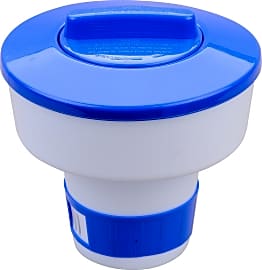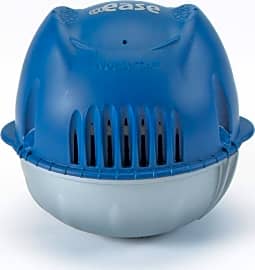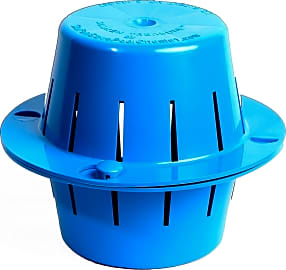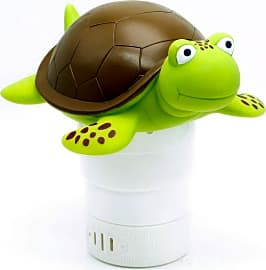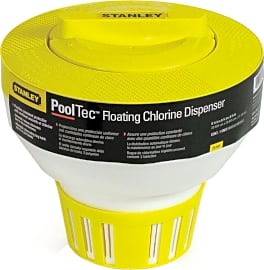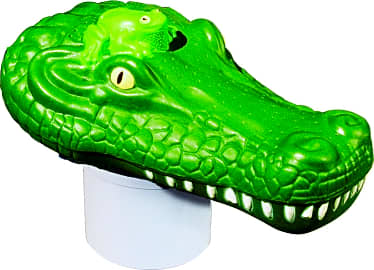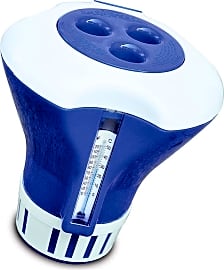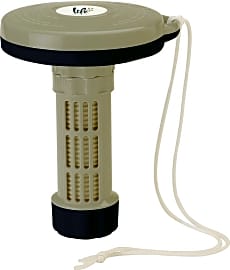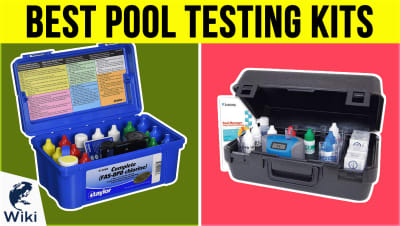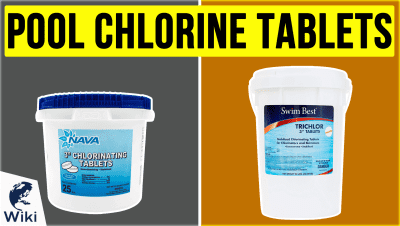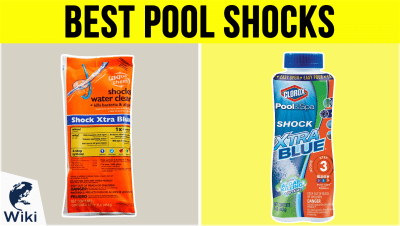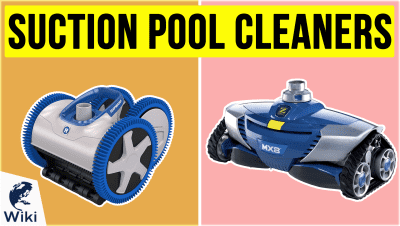The 10 Best Floating Chlorine Dispensers

This wiki has been updated 35 times since it was first published in February of 2017. Maintaining a clean, healthy swimming pool doesn't have to be a chore, thanks to floating chlorine dispensers that do the sanitizing work for you. Just drop a few tablets into one and let it bob around to keep your water at optimal chemical levels. These days, they come in a lot of fun and whimsical options, so you aren't stuck with those boring old blue and white models (but they're here, too). When users buy our independently chosen editorial selections, we may earn commissions to help fund the Wiki.
Editor's Notes
October 07, 2020:
Pools are notorious for requiring a lot of work to maintain. Keeping the water clean requires regularly testing the water, the constant addition chlorine and other chemicals, and keeping the bottom free of a build up of debris. Luckily, there are a number of handy products that can greatly reduce the amount of time you have to physically spend doing it. In addition to a pool vacuum and an automatic skimmer, you can get yourself one of the floating chlorine dispensers on this list. Equipped with all of these items, your pool will be much less of a hassle to maintain.
If you appreciate the classics, then you will probably want to stick with the traditional blue and white dispensers that have been popular in pools for decades, such as the Aquatix Pro and PoolSupplyTown Atie 90446. The Stanley PoolTec 32855 is also available in a classic blue and white model, but it can be had in a vibrant yellow if you prefer, which some may find stands out a bit more in the water making it easy to quickly spot.
For those that find these somewhat nondescript options a bit too boring, we have included the Game Derby Duck, WWD Premium Turtle, Jed Pool Tools Shark Fin, and Poolmaster Chlori-Critter, the last of which comes in several fun animals. These will all add a bit of fun and whimsy to your pool and might even make for a good conversation starter when entertaining guests in your backyard.
We think many home owners, especially those with pets or kids who often play around their pool, may appreciate the Sunken Treasure SUN-TR-LB1, which is actually designed to sit at the bottom of the pool, rather than float at the surface. Because of this, it isn't suitable for above-ground pools with vinyl liners, as it can easily damage those, but it also means that it won't be constantly releasing chlorine fumes into the air.
March 23, 2019:
Pool maintenance can be a hassle unless you have one of these floating chlorine dispensers. Instead of trying to mix the chemicals into your skimmer, you simply put a few tablets into one of these, drop it into your pool, and walk away. It's that simple. We have rounded up both whimsical and traditional models for you to choose from. The Game Derby Duck works day and night, featuring solar panels that charge the battery and allow it to function as a floating light when it is dark. The WWD Premium Turtle, Jed Pool Tools Shark Fin, and Poolmaster Chlori-Critter are some other fun designs that show you don't take life too seriously. While these can be good choices for a home with kids, it is worth noting they may be tempted to play with them, so you might want to take any of them out of the pool when children are swimming. If you prefer something a bit more traditional, consider the Aquatix Pro,Stanley PoolTec 32855, Life MDI802, and PoolSupplyTown Atie 90446, the last which has an integrated thermometer. We feel the Sunken Treasure SUN-TR-LB1 deserves an honorable mention, since it actually sits at the bottom of the pool, prevents the release of harmful fumes into the air, and also slowing the pace at which the tablets dissolve. When empty, it rises to the surface to let you know it is time to refill it. The Ease Sanitizing System Combo is an all-in-one solution for hot tubs that includes chemicals, though it is a bit pricey.
Special Honors
Walking on Water Jesus Whether you are religious or simply looking for a comical item to add to your pool, you can appreciate the Walking on Water Jesus. He stands roughly 8.5 inches tall and, while he may not make your water holy or turn it to wine, he can certainly help keep it sparking clean. It holds up to five 3-inch tablets and comes with a 30-day money-back guarantee. thewowjesus.com
How Chlorine Works To Clean Swimming Pools
This is because it affects the proportion of hypochlorous acid to hypochlorite ion.
Regular chlorination is vital to keeping a pool looking clean and, more importantly, free of harmful microorganisms that could potentially cause medical problems in people. Pool water that isn't properly sanitized can cause ear infections, athlete's foot, gastroenteritis, and even Legionnaires disease. Understanding the basic chemistry of chlorine isn't difficult once you learn how it functions at a molecular level. Chlorine performs three essential functions in pool water. It acts as a rapid and continuous sanitizer, effectively kills algae, and oxidizes undesired contaminants.
When chlorine is added to a pool, it breaks down into a a variety of different chemicals, the main two being hypochlorite ion and hypochlorous acid. These two chemicals kill bacteria and other microorganisms by attacking lipids found in their cell walls, as well as destroying the enzymes inside of the cells, which results in them oxidizing and being rendered harmless. Both hypochlorite ion and hypochlorous acid are capable of destroying bacteria and microorganisms. The main differences between the two are the power and speed at which they cause oxidization. Hypochlorite ion is less effective and can take as much as 30 minutes to fully oxidize an organism, whereas hypochlorous acid is nearly 80 times stronger and can do it in a matter of seconds.
A pool's pH level also plays a role in how well, and how quickly, chlorine works to sanitize water. This is because it affects the proportion of hypochlorous acid to hypochlorite ion. The higher a pool's pH rises above 6.0, the lower the concentration of active and available hypochlorous acid, no matter how much chlorine is added. If the pH level of a pool hits 9.0, there will be virtually no usable hypochlorous acid in its water. This is why it is important to keep an eye on your pH level using a pH tester.
Once the hypochlorous acid and hypochlorite ion have finished oxidizing the microorganisms in the pool water, a couple of things happen. Some of it will gas off and dissipate through the surface, some will break down into component atoms, and some will combine with other chemicals in the water, such as nitrogen and ammonia, turning into chloramine.
The Many Benefits Of Floating Chlorine Dispensers
Floating chlorine dispensers offer a number of benefits over other chlorine delivery systems, one of the most obvious being ease of use. Unlike with in-line and saltwater chlorinators, there is no costly equipment to buy. They also don't require any complicated installation process either. Simply add a couple of tablets to the dispenser and place it in the water. That is literally all you have to do.
Granules require you to premix them in a separate bucket before they can be added into the pool water.
Floating dispensers make use of tablets, rather than granules or liquid chlorine. The tablet form of chlorine is much easier to work with than its counterparts. Granules require you to premix them in a separate bucket before they can be added into the pool water. Once mixed, you need to deal with hassle of trying to pour it into the skimmer without splashing yourself or your clothes with the noxious mixture. Some people choose to add the granules directly to the skimmer basket, but most professionals recommend against this as it can damage the skimmer basket. Liquid chlorine doesn't require any premixing, but it does have the same potential to splash onto your skin or clothes as you pour it into the pool. Since pure chlorine can irritate the skin, it is important to be very careful when working with the liquid form. Tablets don't have any of these problems. Simply put on a pair of gloves, grab a tablet, and drop it into your floating dispenser.
Since tablets last a long time, you can add multiple to a floating dispenser and you won't have to be so diligent about checking your pool's chlorine levels. You can rest easy knowing that your pool water will always be clean and ready for you to take a swim. Knowing when to add more chlorine to a pool is as simple as checking the dispenser, too. Simply open the top and take a look inside. If the tablet is dissolved, it is time to drop another in the dispenser.
The Truth About Eye Irritation And Chlorine
Donning a bathing suit and taking a dip in a pool can be one of the most enjoyable things you do all summer. For some though, they may be so worried about splashing around in a body of water full of chemicals that they may forgo spending time in a pool all together. This is understandable considering that chlorine is a known irritant that can be dangerous when someone is exposed to it in high levels. The key here is high levels. The truth is that a properly maintained swimming pool offers no adverse health risks.
Donning a bathing suit and taking a dip in a pool can be one of the most enjoyable things you do all summer.
Many people assume that if they spot a bunch of red-eyed swimmers getting out of a pool that means it has too much chlorine in it. This isn't 100 percent true though. While an overabundance of chlorine in a pool can cause eye irritation, it is more often caused by not enough chlorine in the water. When chlorine interacts with substances in the pool added by unhygienic swimmers, such as kids who pee in the pool or unshowered bathers that introduce perspiration and skin oils into the water, it turns into chloramines. Chloramines are known to cause red, irritated eyes and are much more likely to be found in a pool in a high level than an overabundance of chlorine.
Another interesting thing to note is that chloramines smell very similar to chlorine, and release into the air more readily. This means that when you walk up to a swimming pool with a very strong chemical smell, it is usually a result of chloramines and not actually chlorine. Since pools that have a high level of chloramines will have a low level of available chlorine, if you have ever swam in a pool like this and experienced eye irritation, it wasn't a result of chlorine as you likely thought at the time. It was caused by the chloramines.


